Service Alert
Delay in delivery of CDs
We are currently experiencing a delay with CD production. CDs are being sent and will be delivered as soon as possible. We apologize for the inconvenience.
We are currently experiencing a delay with CD production. CDs are being sent and will be delivered as soon as possible. We apologize for the inconvenience.
Showing 1 - 20 of 76053 items

By John Hagee. 2011
This new book by New York Times bestselling author and pastor, John Hagee, says the United States is heading into…
a “Perfect Storm.” Titanic. John F. Kennedy’s assassination. 9/11. John Hagee maintains that these American tragedies all have one element in common: they were unthinkable. And in the opening pages of his newest book, Can America Survive? Hagee uses these tragedies to prove two points: that the unthinkable can happen and, given the right conditions, the unthinkable can quickly become the inevitable.In Can America Survive? Hagee asserts that the seeds for tragedy are once again being sown, evidenced by the disturbing economic, geopolitical, and religious trends that now threaten to dismantle the very nation itself. “Think it can’t happen?” Hagee asks in a theme repeated throughout the book. “Think again.” Indeed, Hagee presents alarming examples of recent events, current research, scientific evidence, and biblical prophecy that are gathering to create a “perfect storm” that could bring down the “unsinkable” United States of America.Can America Survive? is not just a warning. It is a wake-up call and a rallying cry to Christian citizens everywhere to prevent the next unthinkable American disaster. After all, as Hagee points out, “those who do not remember the mistakes of the past are doomed to repeat them in the future.” Think it can’t happen? Think again.
By Matthew Alexander, John R. Bruning. 2008
Finding Abu Musab al Zarqawi, the leader of Al Qaeda in Iraq, had long been the U.S. military's top priority…
-- trumping even the search for Osama bin Laden. No brutality was spared in trying to squeeze intelligence from Zarqawi's suspected associates. But these "force on force" techniques yielded exactly nothing, and, in the wake of the Abu Ghraib scandal, the military rushed a new breed of interrogator to Iraq. Matthew Alexander, a former criminal investigator and head of a handpicked interrogation team, gives us the first inside look at the U.S. military's attempt at more civilized interrogation techniques -- and their astounding success. The intelligence coup that enabled the June 7, 2006, air strike onZarqawi's rural safe house was the result of several keenly strategized interrogations, none of which involved torture or even "control" tactics. Matthew and his team decided instead to get to know their opponents. Who were these monsters? Who were they working for? What were they trying to protect? Every day the "'gators" matched wits with a rogues' gallery of suspects brought in by Special Forces ("door kickers"): egomaniacs, bloodthirsty adolescents, opportunistic stereo repairmen, Sunni clerics horrified by the sectarian bloodbath, Al Qaeda fanatics, and good people in the wrong place at the wrong time. With most prisoners, negotiation was possible and psychological manipulation stunningly effective. But Matthew's commitment to cracking the case with these methods sometimes isolated his superiors and put his own career at risk. This account is an unputdownable thriller -- more of a psychological suspense story than a war memoir. And indeed, the story reaches far past the current conflict in Iraq with a reminder that we don't have to become our enemy to defeat him. Matthew Alexander and his ilk, subtle enough and flexible enough to adapt to the challenges of modern, asymmetrical warfare, have proved to be our best weapons against terrorists all over the world.
From Rick Wilson—longtime Republican strategist, political commentator, Daily Beast contributor—the #1 New York Times bestseller about the disease that is…
destroying the conservative movement and burning down the GOP: Trumpism.Includes an all-new chapter analyzing Trump&’s impact on the 2018 elections.In the #1 New York Times bestselling Everything Trump Touches Dies, political campaign strategist and commentator Rick Wilson delivers &“a searingly honest, bitingly funny, comprehensive answer to the question we find ourselves asking most mornings: &‘What the hell is going on?&’ (Chicago Tribune). The Guardian hails Everything Trump Touches Dies, saying it gives, &“more unvarnished truths about Donald Trump than anyone else in the American political establishment has offered. Wilson never holds back.&” Rick mercilessly exposes the damage Trump has done to the country, to the Republican Party, and to the conservative movement that has abandoned its principles for the worst President in American history.Wilson unblinkingly dismantles Trump&’s deceptions and the illusions to which his supporters cling, shedding light on the guilty parties who empower and enable Trump in Washington and in the media. He calls out the race-war dead-enders who hitched a ride with Trump, the alt-right basement dwellers who worship him, and the social conservatives who looked the other way. Publishers Weekly calls it, &“a scathing, profane, unflinching, and laugh-out-loud funny rebuke of Donald Trump and his presidency.&”No left-winger, Wilson is a lifelong conservative who delivers his withering critique of Trump from the right. A leader of the Never Trump movement, he warned from the start that Trump would destroy the lives and reputations of everyone in his orbit, and Everything Trump Touches Dies is a deft chronicle the tragicomic political story of our time. From the early campaign days through the shock of election night, to the inconceivable train-wreck of Trump&’s first year. Rick Wilson provides not only an insightful analysis of the Trump administration, but also an optimistic path forward for the GOP, the conservative movement, and the country. &“Hilarious, smartly written, and usually spot-on&” (Kirkus Reviews), Everything Trump Touches Dies is perfect for those on either side of the aisle who need a dose of unvarnished reality, a good laugh, a strong cocktail, and a return to sanity in American politics.
NEW YORK TIMES and WALL STREET JOURNAL BESTSELLERThe former FDIC chairwoman, and one of the first people to acknowledge the…
full risk of subprime loans, offers a unique perspective on the financial crisis.Appointed by George W. Bush as the chairman of the Federal Deposit Insurance Corporation (FDIC) in 2006, Sheila Bair witnessed the origins of the financial crisis and in 2008 became—along with Hank Paulson, Ben Bernanke, and Timothy Geithner—one of the key public servants trying to repair the damage to the global economy. Bull by the Horns is her remarkable and refreshingly honest account of that contentious time and the struggle for reform that followed and continues to this day.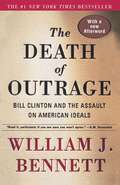
By William J. Bennett. 1998
Today we see little public outrage about Bill Clinton's misconduct. With enormous skill, the president and his advisors have constructed…
a defensive wall built of bricks left over from Watergate: diversion, half-truth, equivocation, and sophistry. It is a wall that has remained unbreached. Until now. In The Death of Outrage: Bill Clinton and the Assault on American Ideals, former cabinet secretary and bestselling author William J. Bennett dismantles the president's defenses, brick by evasive brick, and analyzes the meaning of the Clinton scandals: why they matter, what the public reaction to them means, and the social and political damage they have already inflicted on America. For, despite Bill Clinton's position in public opinion polls, the most persuasive public arguments made by the president's supporters wither under the clear light of moral reason and common sense. The Death of Outrage exposes the fallacious and demeaning logic that argues our economic well-being is the only important measure of presidential performance; torpedoes the deep but wholly unexamined respect for European sophistication about "private matters"; and explains why the president's troubles are not the result of a "vast, right-wing conspiracy," but are the result of his own doings. The Death of Outrage shows How the president's actions, far from being irrelevant to the conduct of his affairs, have severely restricted his ability to govern. The unprecedented recklessness of the Clinton administration in everything from influence peddling to sexual misconduct to alarming tactics of intimidation. How the president and his defenders have exploited the natural tolerance of the American people -- and made a mockery of the rule of law. Why the Clinton scandals -- from the Travel Office, to Filegate, to the Rose Law Firm billing records, to the Lewinsky Affair -- are neither a creation of the tabloid press, nor independent of one another. Bill Bennett explains why presidential character matters; why allegations of sexual misconduct need to be taken seriously; why reasoned judgment is the mark of a healthy democracy; and why the ends don't justify the means. Explosive and hard-hitting, powerful in its logic, carefully reasoned in its conclusions, The Death of Outrage is directed at a shameful chapter of American history. It is an urgent call for American citizens to repudiate the deep corruption of Bill Clinton, and the corrupting arguments made in his defense.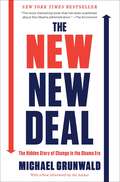
By Michael Grunwald. 2012
In a riveting account based on new documents and interviews with more than 400 sources on both sides of the…
aisle, award-winning reporter Michael Grunwald reveals the vivid story behind President Obama’s $800 billion stimulus bill, one of the most important and least understood pieces of legislation in the history of the country. Grunwald’s meticulous reporting shows how the stimulus, though reviled on the right and the left, helped prevent a depression while jump-starting the president’s agenda for lasting change. As ambitious and far-reaching as FDR’s New Deal, the Recovery Act is a down payment on the nation’s economic and environmental future, the purest distillation of change in the Obama era. The stimulus has launched a transition to a clean-energy economy, doubled our renewable power, and financed unprecedented investments in energy efficiency, a smarter grid, electric cars, advanced biofuels, and green manufacturing. It is computerizing America’s pen-and-paper medical system. Its Race to the Top is the boldest education reform in U.S. history. It has put in place the biggest middle-class tax cuts in a generation, the largest research investments ever, and the most extensive infrastructure investments since Eisenhower’s interstate highway system. It includes the largest expansion of antipoverty programs since the Great Society, lifting millions of Americans above the poverty line, reducing homelessness, and modernizing unemployment insurance. Like the first New Deal, Obama’s stimulus has created legacies that last: the world’s largest wind and solar projects, a new battery industry, a fledgling high-speed rail network, and the world’s highest-speed Internet network. Michael Grunwald goes behind the scenes—sitting in on cabinet meetings, as well as recounting the secret strategy sessions where Republicans devised their resistance to Obama—to show how the stimulus was born, how it fueled a resurgence on the right, and how it is changing America. The New New Deal shatters the conventional Washington narrative and it will redefine the way Obama’s first term is perceived.
By James Carville, Paul Begala. 2002
The political strategists who directed the Clinton campaign's War Room reveal the lessons and secrets from their hard-fought battles --…
and how to use these highly effective strategies for success in everyday life. James Carville and Paul Begala have waged political war all across America and on three continents. They've won some of the most spectacular political victories of the twentieth century and lost a few campaigns too. Along the way, they've learned a few lessons. Some sound simple, like "Never Quit," some comic, like "Kiss Ass," and some are more complicated and nuanced, like "Strategy Ain't Tactics." But each lesson contains tried-and-true wisdom, illustrated with colorful stories from long political experience -- many never told before: Find out how Carville's mother, Miz Nippy, used a bass boat to "frame the debate" in selling encyclopedias. Discover what success secret Hillary Rodham Clinton and Tom DeLay share. Learn the War Room tricks for sharpening your message and delivering the perfect sound bite. And much more. Whether you are a senior executive or a secretary, a political junkie or the president of the United States, the rules to live by can be found in Buck Up, Suck Up...and Come Back When You Foul Up.
By Flo Groberg, Tom Sileo. 2001
In an inspiring story of valor and the making of a hero, Florent Groberg—who grew up in France and emigrated…
to the US—becomes the first immigrant in forty years to receive the Congressional Medal of Honor after he tackled a suicide bomber in Afghanistan.Florent &“Flo&” Groberg was born in the suburbs of Paris and moved to the US with his family in middle school. He became a naturalized citizen in 2001. After attending the University of Maryland, he joined the US Army and twice deployed to Afghanistan. In August of 2012, Flo was guarding a high-level US-Afghan delegation and noticed someone suspicious: a local man stumbling toward his patrol. Flo reacted quickly and ran to tackle the man—who was wearing a suicide vest. Four people died in the subsequent explosion, but many others were spared. Flo himself spent the next three years undergoing surgeries at Walter Reed Medical Center, and in 2015 he was given the nation&’s highest military award, the Congressional Medal of Honor—the first immigrant to be so recognized since the Vietnam War.What prepares a soldier for those critical moments in combat? 8 Seconds of Courage tells Flo&’s story from his childhood in France to his decision to enlist and the grueling training he underwent at US Army Ranger School. As a field commander on the front lines in Afghanistan he formed close and lasting bonds with his fellow soldiers. It was this powerful sense of responsibility that compelled him to take action to save lives, even at the risk of his own.&“Flo&’s incredible tale of bravery and service is also a stark reminder that for many of our warriors, coming home is not the end of the fight. Flo finds a way to live…Truly an inspiration&” (Jon Stewart). In his own words, Flo provides that essential insight into his selfless act while remembering his four fallen brothers in arms. 8 Seconds of Courage is a story of heroism, sacrifice, and camaraderie in wartime.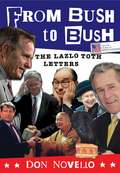
By Don Novello. 2003
The passionate correspondence of a proud (if concerned) American!From the reign of Bush the First through the hilarious Clinton Years…
and to the restoration of the Bush Dynasty with Dubya, one lone crusader, Lazlo Toth, has been at work dispensing advice, offering ideas, and launching investigations on your behalf. Now this important effort has been collected and presented for instruction to the ages.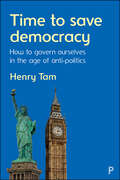
By Henry B. Tam. 2018
To govern ourselves or not to? This is the existential question of politics. In the face of seemingly insurmountable challenges,…
Henry Tam explores what should be done to revive democracy, setting out in a clear and accessible manner 9 key areas where reforms are necessary to ensure we can govern ourselves more effectively.
This book explores Britain’s involvement in the Dhofar War of 1963-1976, focusing on the military aspects of this conflict in…
Southern Oman. It reveals how both the Conservative and Labour governments in office during this time provided military and security assistance to Oman’s rulers without parliamentary or press scrutiny. Based on archival material and witness accounts, as well as existing secondary source literature and memoirs, this study provides new insights into Britain’s clandestine embroilment in the Dhofar War, an often overlooked but historically significant intervention in the Middle East. This book will be a valuable resource for scholars and students interested in the complex and often controversial history of Britain’s involvement in Middle Eastern politics in the post-colonial period.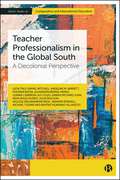
By Leon Tikly, Rafael Mitchell, Angeline M. Barrett, Poonam Batra, Alexandra Bernal, Leanne Cameron, Alf Coles, Zawadi Richard Juma, Nidia Aviles Nunez, Julia Paulson, Nigusse Weldemariam Reda, Jennifer Rowsell, Michael Tusiime, Beatriz Vejarano. 2024
This book provides a decolonial critique of dominant global agendas concerning teacher professionalism and proposes a new understanding based on…
UNESCO-funded research with teachers based in Colombia, Ethiopia (Tigray), India, Rwanda and Tanzania. It opens by outlining dominant conceptions of teacher professionalism as they appear in the global literature. It then introduces Ndlovu-Gatsheni’s (2013) three dimensions of coloniality, namely, the coloniality of power, of knowledge and of being, as a framework for considering the effects of the colonial legacy on teacher professionalism and setting out the teachers’ ideas concerning the barriers and affordances to their professionalism. This provides a basis for outlining the teachers’ perspectives on how teacher professionalism may be conceptualised, which is discussed in relation to existing global narratives/conceptions. The main arguments advanced in this book are that a decolonial lens is helpful for contextualising the perspectives of teachers in the global South; the lived experiences and material conditions of these teachers are often neglected in dominant discourses; the importance of situating the perspectives of teachers in an understanding of local contexts and realities; and, that in contrast to deficit discourses that predominate in the global literature, there is much that can be learned about teacher professionalism from teachers in the global South.
By Mathias Binswanger. 2024
Wenn Sie die Zukunft der wirtschaftlichen und gesellschaftlichen Entwicklung angesichts der Digitalisierung verstehen wollen, ist dieses Buch genau die richtige…
Lektüre für Sie! Mathias Binswanger diskutiert in seinem neuen Buch die Digitalisierung in Zusammenhang mit der Funktionsweise der kapitalistischen Wirtschaft. Es eröffnet so einen anderen Zugang zur Thematik der Digitalisierung, der erstmals aufzeigt, warum diese die Wirtschaft zunehmend vom Menschen abkoppelt, die Produktivität in der Produktion weiter steigert, gleichzeitig aber zu immer mehr Bürokratie führt und dadurch weiterhin Vollbeschäftigung garantiert. Damit verbunden ist immer mehr Bequemlichkeit, aber auch immer mehr Überwachung und Kontrolle der Menschen und ein erhöhter Zwang zu konformem Verhalten. Der Autor befasst sich mit grundlegenden Fragen, wie: Wollen wir eine solche Entwicklung tatsächlich? Ist es klug, sich von bestimmten digitalen Lösungen, Systemen oder Prozessen abhängig zu machen, die wir gar nicht mehr durchschauen? Und wie können wir gegensteuern? Die Antwort lautet: Wir müssen analoge Systeme und Prozesse erhalten, damit Wirtschaft und Gesellschaft resilient bleiben. Es muss weiterhin möglich sein, mit Bargeld zu bezahlen, in selbstgesteuerten Fahrzeugen ohne Überwachungselektronik zu fahren, in nicht smarten Häusern zu leben, oder auf die Verwendung von Gesundheitsapps zu verzichten. Die Aufrechterhaltung solcher analogen Lösungen ist aber gegen die Logik des Systems. Denn jeder nicht systemkonforme Akt stört die digitalen Optimierungsprozesse. Das wird in nicht allzu ferner Zukunft für erhebliche Konflikte sorgen.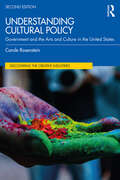
This textbook provides an introduction to cultural policy in the US, enabling both students and practitioners to understand how government…
impacts the arts and culture.Starting with an historical overview of why and how the US developed a national cultural policy, the book goes on to trace the contemporary system of national, state, and local arts and cultural agencies through which that policy is put into practice. Readers are provided both in-depth frameworks for conceptualizing how government regulation and provision shape the arts and culture and carefully illustrated examples of cultural policy in action. Covering critical issues in US cultural policy such as the Culture Wars, culture-led development and gentrification, and field-wide data and research capacities, the book builds a bridge between theory, practice, and politics in the arts and culture. This new edition includes enhanced visualizations and policy maps, expanded policy labs, and a new section on cultural policy during COVID-19.The result is a text that is essential reading for students and reflective practitioners of arts and cultural management and administration.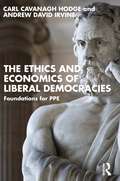
By Carl Cavanagh Hodge, Andrew David Irvine. 2024
Rarely in the short history of liberal-democratic government has a primer on basic liberal-democratic values and institutions been more needed…
than now. Popular discontent, even anger, with democratic governments has grown steadily over the past twenty years. Not since the 1930s have citizens and their elected officials been so baffled about their respective roles in the maintenance of both democratic governments and liberal economies. This book attempts to address this growing need. Especially written as a primer for courses in Philosophy, Politics and Economics (PPE), it has introductory chapters on all three main disciplines. It also has chapters on the rule of law and on three important public-policy areas – Corruption, Climate and Civil Society. Individual topics discussed include free and fair elections, populism, responsible government, republican and Westminster systems of government, regulated free markets, the Great Recession of 2008, globalization, greenwashing, identity politics, academic freedom, utilitarianism, social contract theory, positive and negative liberty, and the good life.Historically informed, The Ethics and Economics of Liberal Democracies: Foundations for PPE is sure to be of interest to students who are interested in public-policy work, as well as those who are interested in both the theory and practice of democratic government.Key Features: Written especially for PPE (Philosophy, Politics and Economics) courses and students Focuses on the key values and institutions of modern democracies Includes chapters on both the theory and practice of democratic government and public-policy work Provides a comprehensive glossary of relevant terms from all three disciplines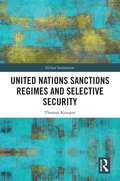
By Thomas Kruiper. 2024
This book investigates the selective nature of UN sanctions regimes with a specific focus on the post-Cold War era. Legally…
binding on all members, UN sanctions are the most effective and legitimate non-violent multilateral tools to respond to international security threats. They are also symbolically more powerful than unilateral or multilateral sanctions because they enjoy global support. However, while dozens of threats to international peace were met with UN sanctions since 1990, many others were not. How can we explain this incoherent approach? With a focus on the selectiveness, rather than effectiveness of UN sanctions the author reflects on the shifting geopolitical tensions between Security Council members and uses a variety of widely used academic datasets to provide a unique overview of what determines sanctions and sanctionable events. The primary audience will be scholars and students of international relations, international organizations, security studies, and political economy.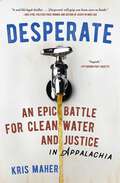
By Kris Maher. 2021
Set in Appalachian coal country, this &“superb&” (Pittsburgh Post-Gazette) legal drama follows one determined lawyer as he faces a coal…
industry giant in a seven-year battle over clean drinking water for a West Virginia community.For two decades, the water in the taps and wells of Mingo County didn&’t look, smell, or taste right. Could the water be the root of the health problems—from kidney stones to cancer—in this Appalachian community? Environmental lawyer Kevin Thompson certainly thought so.For seven years, Thompson waged an epic legal battle against Massey Energy, West Virginia&’s most powerful coal company, helmed by CEO Don Blankenship. While Massey&’s lawyers worked out of a gray glass office tower in Charleston known as &“the Death Star,&” Thompson set up shop in a ramshackle hotel in the fading coal town of Williamson. Working with fellow lawyers and a crew of young activists, Thompson would eventually uncover the ruthless shortcuts that put the community&’s drinking water at risk.Retired coal miners, women whose families had lived in the area&’s coal camps for generations, a respected preacher and his brother, all put their trust in Thompson when they had nowhere else to turn. Desperate is a masterful work of investigative reporting about greed and denial, &“both a case study in exploitation of the little guy and a playbook for confronting it&” (Kirkus Reviews). Maher crafts a revealing portrait of a town besieged by hardship and heartbreak, and an inspiring account of one tenacious environmental lawyer&’s mission to expose the truth and demand justice.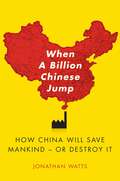
By Jonathan Watts. 2010
As a young child, Jonathan Watts believed if everyone in China jumped at the same time, the earth would be…
shaken off its axis, annihilating mankind. Now, more than thirty years later, as a correspondent for The Guardian in Beijing, he has discovered it is not only foolish little boys who dread a planet-shaking leap by the world’s most populous nation. When a Billion Chinese Jump is a road journey into the future of our species. Traveling from the mountains of Tibet to the deserts of Inner Mongolia via the Silk Road, tiger farms, cancer villages, weather-modifying bases, and eco-cities, Watts chronicles the environmental impact of economic growth with a series of gripping stories from the country on the front line of global development. He talks to nomads and philosophers, entrepreneurs and scientists, rural farmers and urban consumers, examining how individuals are trying to adapt to one of the most spectacular bursts of change in human history, then poses a question that will affect all of our lives: Can China find a new way forward or is this giant nation doomed to magnify the mistakes that have already taken humanity to the brink of disaster?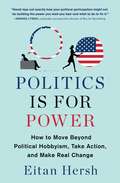
A groundbreaking analysis of political hobbyism—treating politics like a spectator sport—and an urgent and timely call to arms for the…
many well-meaning, well-informed citizens who follow political news, but do not take political action.Do you consider yourself politically engaged? Probably, yes! But are you, really? The uncomfortable truth is that most of us have good intentions. We vote (sometimes) and occasionally sign a petition or attend a rally. But we mainly &“engage&” by consuming politics as if it&’s entertainment or a hobby. We obsessively follow the news and complain about the opposition to our friends or spouse. We tweet and post and share. The hours we spend on politics are used mainly as pastime.Instead, political scientist and data analyst Eitan Hersh offers convincing evidence that we should be spending the same number of hours building political organizations, implementing a long-term vision for our local communities, and getting to know our neighbors, whose votes will be needed for solving hard problems. We could be accumulating power so that when there are opportunities to make a difference—to lobby, to advocate, to mobilize—we will be ready. Aided by cutting-edge social science as well as remarkable stories of ordinary citizens who got off their couches and took political power seriously, this book shows us how to channel our energy away from political hobbyism and toward empowering our values.In an age of political turmoil and as the 2020 election looms, Politics Is for Power is an inspiring, vital read that will make you hopeful for America&’s democratic future.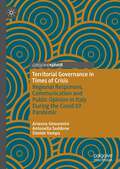
By Arianna Giovannini, Antonella Seddone, Davide Vampa. 2024
This book offers a comprehensive exploration of multi-level governance, political communication and public opinion in Italy during the Covid-19 emergency.…
Italy’s territorial arrangements of blending aspects of unitary and federal systems within a ‘regionalized’ framework underscore the tensions between centralization and decentralization, a theme echoed in many other nations. Given the state of flux and lack of clear direction of Italian regionalism at the onset of the pandemic, the analysis provides particularly interesting insights into the effects of this unprecedented crisis on regional dynamics. Covid-19 acted as a catalyst, amplifying and exacerbating existing territorial disparities, while also highlighting the resilience and adaptability of some regions. The book delves into the national and sub-national responses to the pandemic, examines how politicians and regional leaders presented them, and how citizens perceived these responses. Through this analysis, it provides deeper insights into the intricate interplay between centralization and decentralization, as well as the diverse strategies employed to address a wide spectrum of health, social, and economic challenges. Ultimately, by moving from institutions to citizens, the book reflects on how external shocks can both challenge the democratic underpinnings of decentralization and offer opportunities to strengthen them.